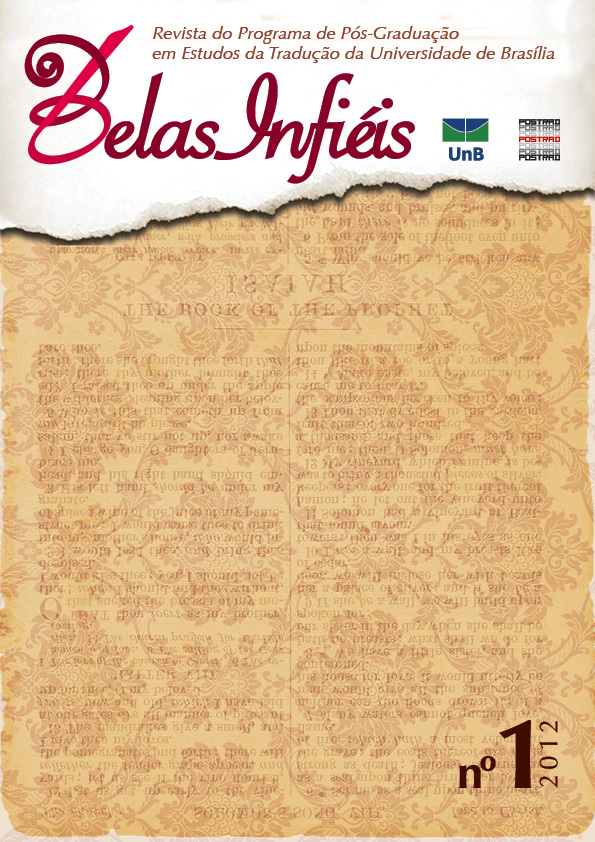A TRADUÇÃO JORNALÍSTICA SOB UMA ABORDAGEM CRÍTICA:
ANÁLISE DA TRADUÇÃO DE UMA REPORTAGEM DA NATIONAL GEOGRAPHIC PARA O CONTEXTO BRASILEIRO
DOI:
https://doi.org/10.26512/belasinfieis.v1.n1.2012.11165Palabras clave:
Tradução, Jornalismo, Análise críticaResumen
O texto jornalístico possui características próprias que o distinguem de outros gêneros. Além dos padrões de edição incidentes sobre a construção da reportagem, há diversos fatores externos que condicionam sua produção, quais sejam: ideologia, política de imprensa, expectativa do leitor, necessidade de retorno financeiro, princípios éticos, entre outros. Considerando-se a tradução também uma atividade sujeita a fatores que excedem o domínio linguístico, como incompatibilidades culturais, função e contexto da tradução, este artigo propõe uma análise crítica das estratégias adotadas pelo tradutor e suas implicações para o produto final ”“ a reportagem traduzida. O corpus analisado é composto por uma reportagem originalmente escrita em língua inglesa e publicada pela revista americana National Geographic e sua tradução para o português brasileiro, publicada pela National Geographic Brasil.
Descargas
Citas
Código de Ética dos Jornalistas Brasileiros. Disponível em: <http://www.abi.org.br/paginaindividual.asp?id=450>.Acesso em:27dez. 2011.
COSTA, M. J. D. ZIPSER, M. E. POLCHLOPEK, S.A. Leitura e tradução no texto jornalístico: Os vários caminhos do café.Caligrama:Revista de Estudos epesquisas em linguagem e mídia, v.4.
CULLETON, José Guillermo. Análise da tradução do espanhol para o português de textos jornalísticos na mídia impressa no Brasil. Dissertação de mestrado. Universidade Federal de Santa Catarina. 2005.
Dicionário MichaelisUOL versão software, 2005.
LIMA, Alceu Amoroso. O jornalismo como gênero literário. São Paulo: EDUSP, 1990.
National Geographic”“Janeiro de 2007 ”“Ed. 211.
National Geographic Brasil”“Janeiro de 2007 ”“Ed. 82.
VENUTI, Lawrence. A invisibilidade do tradutor. Tradução de Carolina Alfaro, em Palavra 3. Rio de Janeiro: Grypho, 1995.
ZIPSER, Meta Elisabeth. Do fato a reportagem: as diferenças de enfoque e a tradução como representação cultural.Tese de doutorado. Universidade de São Paulo, 2002.
Descargas
Publicado
Cómo citar
Número
Sección
Licencia
Copyright Statement
Given the public access to this journal, the texts are free to use but requires the recognition of the original authorship and initial publication in this journal to be properly stated.
The journal allows the use of works published for non-commercial purposes, including the right to submit the work to publicly accessible databases. Published contributions are the sole and exclusive responsibility of the author(s).
- When submitting papers to be evaluated by the Belas Infiéis journal, the author(s):
- Declare that the contents of the contributions are original and of their original creation, being entirely responsible for their content if there is an objection by third parties.
- Claim to be aware that they should not commit academic plagiarism.
- Declare that the manuscript has not been published, completely or partially, in Portuguese or another language. If it is a translation it should be submitted to the Translated Articles section.
- Declare that the manuscript is not being evaluated by other journals.
- Declare that the manuscript was not submitted to another journal simultaneously.
- Commit(s) to inform the journal of any kind of error or inaccuracy in their contribution (published, in evaluation or in editing) and to collaborate with the editors to make due corrections of the article (when in evaluation or editing) or erratum/retraction (after publication).
- Declare that there is no conflict of interest regarding the published work.
- Authorize its release if it is accepted for publication without any kind of monetary compensation.
- Agree to assign non-exclusive rights to publication to the magazine, remaining free to make their contribution available in other media as long as the publication of the first version in Belas Infiéis magazine is mentioned. They also authorize Belas Infiéis to assign their texts for reproduction in content indexers, virtual libraries and similar platforms.
- Maintain copyright and grant the journal the right of first publication, the work being licensed under theCreative Commons Attribution License.
- Is/Are allowed and encouraged to publish and distribute their work online after the editorial process, which may increase the impact and citation of the published work.
- Authorize the editorial team to make textual adjustments and to adapt the article to the publication rules, when necessary.



















